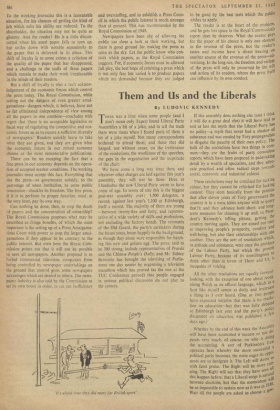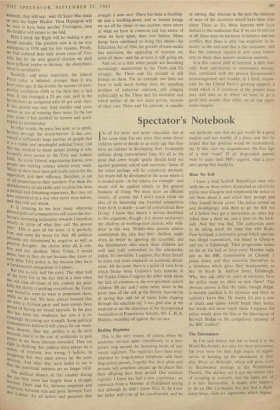Them and Us and the Liberals
By LUDOVIC KENNEDY
kiLltE V■ as a time when some people (and 1 don't mean only Taper) found Liberal Party Assemblies a bit of a joke; and to tell the truth there were times when I found parts of them a bit of a joke myself. Not many correspondents bothered to attend them; and those that did harped, not without cause, on the irrelevance of the resolutions, the woolliness of the speeches, the gaps in the organisation and the ineptitude of the chair.
We have come a long way since then; and whatever other charges are laid against this year's assembly, they will not be these. Here at Llandudno the new Liberal Party seems to have come of age. In terms of size this is the biggest post-war assembly ever: 1,500 delegates, a record, against last year's 1,100 at Edinburgh, itself a record. The majority of them are young —between twenty-five and forty, and represen- tative of a wide variety of skills and professions, not excluding the factory bench. The remnants of the Old Guard, the party's caretakers during the locust years, beam happily in the background, as though they alone were responsible for hatch- ing this new and golden egg. The press, said to be 300 strong, include representatives of Pravda and the Chinese People's Daily; and Mr. Sidney Bernstein has brought the televising of Parlia- ment one day nearer by organising a television marathon which has proved (as the one at the TUC Conference proved) that people engaged in serious political discussion do not play to the camera.
it's about time they did more for British sport.'
If this assembly does nothing else (and I think it will do a great deal else) it will have laid to rest at last the myth that the Liberal Party has no policy—a myth that never had a shadow of substance and was created by Tory propagandists to disguise the paucity of their own policY. The bulk of the resolutions have two things in coal' mon—they are the fruits of party committee reports which have been prepared in painstaking detail by a wealth of specialists, and they advo- cate practical and often radical steps towards social, economic and industrial reform.
These resolutions may be criticised for lacking colour, but they cannot be criticised for lacking content. They stem basically from the premise that after eleven years of Tory government the country is in a mess (does anyone wish to (WI that?); and they advance both short- and lone; term measures for cleaning it up and, in Presi- dent's Kennedy's telling phrase, getting 1",e country moving again. They are aimed not only at improving people's prosperity, comfort and well-being, but also their relationships with one another. They are the sort of resolutions which' in attitude and substance, were once the province of the Labour Party, but which the Present Labour Party, because of its unwillingness think other than in terms of Them and Us. 15 incapable of voicing.
All the other resolutions are equally forward" looking, with the exception of one about recog- nising Welsh as an official language, which to a Scot like myself seems as dotty and irrelevant a thing as I ever heard. (One or two people have expressed surprise that there is no resolu- tion on education—but that was fully debated at Edinburgh last year and the party's policy document on education was published a few days ago.) Whether by the end of this week the Assemblywill have been accounted a success or not de- pends very much, of course, on who is doing the accounting. A sort of Parkinson's 1-avi operates here whereby the more successful 3 political party becomes, the more eager its oPP°: nents are to denigrate it. The Left will damn 11 with faint praise. The Right will be more cun- ning. The Right will say that they have SC" all this happen before, that a Liberal surge is natural .i between elections, but that the momentum will be as impossible to sustain now as it was in 195',.: Wait till the people are asked to choose a rs
ernment, they will say: wait till Super Mac leads us into the Super Market. Then Orpington will be seen to have been another Torrington, then the faithful will return to the fold.
Here I think the Right will be making a pro- found mistake. The position now is in no way analogous to 1958 and for two reasons. Firstly, we had suffered then only seven years of Tory rule, but by the next general election we shall have suffered twelve or thirteen: the disenchant- ment is cumulative.
Secondly, and more important, the Liberal ?arty today is infinitely stronger than it was four years ago. It has double the number of pros- pective candidates (340) in the field that it had then. It has averaged a 23 per cent. poll in the 4-elections as compared with 16 per cent. then. it has gained one seat, held another and come within an ace of winning three more. In the last year alone it has doubled its income and quad- rupled its membership. In other words, the party has now, so to speak, broken through the sound-barrier. It has con- Vinced a sufficiently large number of people that It is a viable and meaningful political force; and this has resulted in many people joining it who formerly were secure in the Tory and Labour folds. As every Liberal organisation knows, new People are making contact almost every week. Many of them have been politically active for the °Pposition, and their influence, therefore, is out of all proportion to their numbers. For them the abandonment of old faiths and loyalties has been a Painful and disturbing experience. But they are now committed in a way they never were before, and they y will not return. It is amazing to me how many otherwise shrewd Political commentators still assess the elec- torate's increasing inclination towards Liberalism will9llY in terms of what they call `the protest Vote.' This is part of the story, it is perfectly true, and none the worse for that. All political attitudes are determined by negative as well as Positive thoughts: the choice, after all, is rela- tive and not absolute. Most Tories, I would Suess, vote as they do not because they know or care what Tory policy is, but because they have a fundamental antagonism to Labour. But this is only half the story. The other half _of the story lies in the fact that at a time when ...tae old class divisions of this country are pain- fully but slowly crumbling everywhere, the Tories and Socialists seem to want to perpetuate them, 'while We do not. We have always boasted that we were a classless party and have always been Proud of having no vested interests. In the past this has been our weakness, but now it is in- creasingly becoming our strength. Some political commentators believe it will always be our weak- . ess, because, they say, politics is to do with Interests, and it is the aim of politicians to gain Power to see those interests rewarded. They are right in thinking that politics must always be a matter of interests, but wrong, I believe, inrr iriagluing that they must always be the same that And what they have failed to see is 'at the traditional interests are no longer valid. theThe Political history of this country during 13_ ", last fifty years has largely been a struggle eween Them and Us, between employer and ati..,1_1,31°Yee, between rich and poor, between Tory "u Labour. To all intents and purposes that
struggle is now over. There has been a levelling- up and a levelling-down, and as human beings we are all far closer to one another, more aware of what we have in common and less aware of what we have apart, than ever before. Many things have combined to bring this about—the Education Act of 1944, the growth of mass media like television, the upgrading of incomes are some of them—and the process is still going on.
And yet at a time when people are becoming increasingly uninterested in the Them and Us struggle, the Them and Us attitude is still foisted on them. For an example one does not have to look much further than the appalling problem of industrial relations, still clinging pathetically to the Them and Us mentality and which neither of the two main parties, because of their own Them and Us attitude, is capable of solving. But whereas in the past the interests of most of the electorate would have been with either Them or Us, those interests now have shifted to the realisation that if we are to survive at all, there must be harmony in industry and not conflict, that there is only one employer in in- dustry in the end and that is the consumer, and that this common interest is now more impor- tant to them than narrow sectarian interests.
It is this radical shift of interests, a shift basi- cally from self-interest to community interest, that, combined with the present Government's mismanagement and muddle, is I think respon- sible for the Liberal Party's growing support; a trend which if it continues at the present pace may well take us to where we want to go a good deal sooner than either we or our oppo- nents imagine.











































 Previous page
Previous page